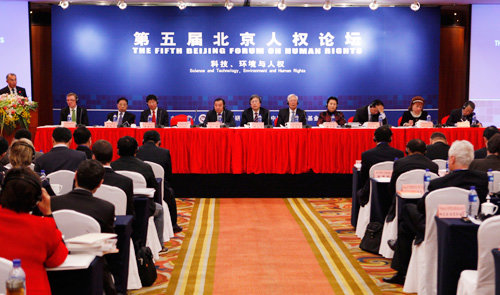|
 |
|
RIGHTS DISCUSSION: The Fifth Beijing Human Rights Forum is held on December 12 (WANG SHEN) |
When Sun Yuan was born in a village in Hobq Desert in north China's Inner Mongolia Autonomous Region, there were no roads, and Sun's mother feared if the infant girl became ill she might not survive the 12-hour journey to the nearest hospital. Sun's grandfather believed Sun would be better off if she lived with relatives in the city, but he was killed when the family's house collapsed in a sandstorm.
Sun's life changed when roads were finally laid down. In order to protect the roads from sandstorms, trees were planted, along with grass and herbs. Sun's father told her that the trees would provide the children with better living conditions. The trees not only halted the sandstorms but also enabled people in the desert to prosper.
Now there are beautiful gardens and clean air in Hobq. Sun, now 12 years old, has a new home and studies at a school as well-equipped as one in the city.
Sun's story sheds light on the relationship between the environment and human rights, a theme of the fifth annual Beijing Human Rights Forum hosted by the China Society for Human Rights Studies from December 12 to 14, where more than 100 human rights experts and officials from 32 countries and regions participated in discussions exploring the intersections of human rights and diverse topics such as the environment, science and technology.
"History is wrought with examples of how the development of science and technology has promoted the liberation of human thought and how the liberation of thought has promoted the development of science and technology in return," said Wang Chen, Minister of China's State Council Information Office at the forum's opening. "The advancement of science and technology has not only improved the quality of life across the globe but also impacted how we perceive human rights."
Wang Wenbiao, once head of a salt factory in Hobq and now Chairman of the China Elion Resource Group, is credited with leading a 24-year campaign to turn Hobq into an oasis.
"Transforming the desert is the greatest philanthropy," Wang said at the forum.
The essential human right to enjoy a healthy and clean environment has been acknowledged by the international community since the late 1960s and early 1970s.
The Declaration of the UN Conference on the Human Environment first connected human rights with environmental protection at the Conference on the Human Environment in Stockholm, Sweden, in 1972.
The UN Draft Declaration of Principles on Human Rights and the Environment of 1994 states, "All persons have the right to a secure, healthy and ecologically sound environment. This right and other human rights, including civil, cultural, economic, political and social rights, are universal, interdependent and indivisible."
The Chinese Government has made a concrete effort to protect people's environmental rights. The National Human Rights Action Plan (2009-10) released by the State Council Information Office recognizes environmental rights as key in the protection of human rights, stating that "China will take an active part in international cooperation in an effort to create an environment favorable for human existence and sustainable development and build a resource-conserving and environmentally friendly society to guarantee the public's environmental rights."
"A good natural environment can ensure human survival and development, therefore realizing human rights," said Seiichi Ota, a 78-year-old Japanese volunteer who over the past 20 years has planted 9 million trees, covering over 5,000 hectares in Inner Mongolia. "If the natural environment that people rely upon for survival is destroyed or threatened, how can we talk about human development? How can we talk about human rights?"
| 